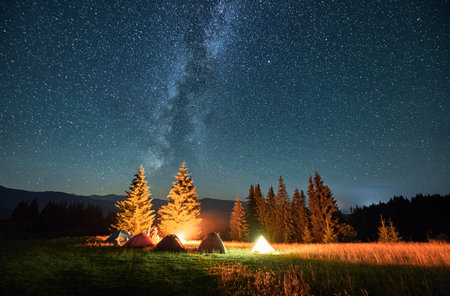Choosing the Best Stargazing Locations in the UK
When planning a stargazing camping trip in the UK, selecting the right location is absolutely crucial for an authentic experience. The UK boasts some of Europe’s finest dark sky sites, with several national parks and remote rural areas recognised for their minimal light pollution and sweeping night skies. Notable locations include Northumberland National Park and Kielder Water & Forest Park, which form the heart of Europe’s largest area of protected night sky—the Northumberland International Dark Sky Park. Equally impressive are Galloway Forest Park in Scotland, renowned as the country’s first Dark Sky Park, and Snowdonia National Park in Wales, both offering vast open spaces and spectacular celestial displays.
For those seeking less-travelled gems, consider Dartmoor or Exmoor National Parks in the South West, both designated as Dark Sky Reserves and beloved by local astronomers for their tranquil settings. Alternatively, smaller rural villages across Yorkshire Dales or the Brecon Beacons provide surprisingly clear views away from urban glare. When selecting your site, always check for official dark sky status, accessibility by car or public transport, and facilities such as nearby campsites or basic amenities. These considerations ensure not only comfort but also an uninterrupted immersion into the wonders of the night sky—a truly memorable British outdoor adventure.
2. Understanding the British Weather and Night Sky Conditions
Planning a stargazing camping trip in the UK demands respect for the island’s famously unpredictable weather and an appreciation of its unique night sky conditions. The British climate, shaped by maritime influences, can turn from clear to cloudy in mere hours, so learning to interpret local forecasts is crucial for any astronomy enthusiast.
Interpreting UK Weather Forecasts
The Met Office is the go-to resource for accurate and up-to-date forecasts. Focus on cloud cover predictions, wind speed, and precipitation. Apps like Clear Outside are tailored to astronomers, providing detailed hourly breakdowns of sky clarity and transparency at your chosen location.
Understanding Cloud Cover and Seasonal Patterns
| Season | Typical Cloud Cover | Best Stargazing Regions |
|---|---|---|
| Spring (Mar-May) | Moderate; showers common | South Downs, Brecon Beacons |
| Summer (Jun-Aug) | Variable; short nights | Northumberland, Galloway Forest |
| Autumn (Sep-Nov) | Mist/fog possible; clearer nights | Yorkshire Dales, Exmoor |
| Winter (Dec-Feb) | Frequent clouds; long dark nights | Cairngorms, Snowdonia |
Optimal Times for Constellations & Astronomical Events
The UK’s latitude allows for excellent views of classic constellations and celestial events, but timing is everything. For example, late autumn through early spring offers the darkest skies after sunset—ideal for spotting Orion or catching meteor showers like the Perseids or Geminids. Always check moon phases to avoid bright moonlight washing out fainter stars.
In summary, successful stargazing in the UK hinges on regularly checking reliable weather sources, understanding regional and seasonal variations in cloud cover, and planning your trip around astronomical calendars. This approach ensures you’ll have the best chance to experience those clear, awe-inspiring British night skies.

3. Essential Gear for UK Stargazing and Camping
When planning a stargazing camping trip in the UK, being properly equipped is half the battle won. The British climate can be unpredictable—think sudden showers, chilly nights, and gusty winds—so it pays to be prepared. Here’s a practical list to help you pack smart and stay comfortable, whatever the weather throws at you.
Camping Necessities Suited to the British Weather
- Waterproof Tent: Opt for a tent with a sturdy rainfly and sealed seams. Even in summer, drizzle is common. Dome tents or tunnel tents work well against wind.
- Four-Season Sleeping Bag: Night temperatures can dip below expectations, especially in open countryside. A sleeping bag rated for lower temperatures ensures a good night’s rest.
- Insulated Sleeping Mat: The ground can sap heat quickly. A foam or inflatable mat provides insulation and extra comfort.
- Layered Clothing: Think base layers (merino wool is popular in the UK), mid-layers like fleeces, and a waterproof outer shell. Don’t forget warm socks, gloves, and a beanie hat.
- Sturdy Footwear: Waterproof walking boots are essential for muddy fields and uneven ground.
- Head Torch: Hands-free lighting is invaluable when moving around camp after dark. Pack spare batteries as well.
Recommended Stargazing Equipment
- Red Light Torch: Preserves your night vision while checking star maps or moving about camp.
- Binoculars: A pair of 7×50 or 10×50 binoculars gives an excellent introduction to deep-sky objects before investing in a telescope.
- Telescope (optional): For more serious observers, a portable refractor or Dobsonian telescope is ideal. Just ensure you know how to set it up in low light.
- Star Chart or Astronomy App: Paper charts are reliable, but many UK stargazers use apps like Stellarium or Sky Guide for real-time guidance.
- Camping Chair or Ground Blanket: Stargazing sessions can last hours; something comfortable to sit or lie on makes all the difference.
Tips for Staying Comfortable Outdoors
- Hot Drinks Flask: A thermos of tea, coffee, or hot chocolate is practically tradition—and helps keep you warm during long observation periods.
- Midge Repellent: In Scottish Highlands and parts of Wales, midges can be relentless in summer. Bring repellent just in case.
- Packed Layers: Always bring an extra layer “just in case.” Weather can turn suddenly, especially near coasts or hills.
- Damp-Proof Bags: Store electronics and star charts in dry bags to protect from dew and showers.
The right kit will make your stargazing experience not only enjoyable but memorable—rain or shine, clear skies or clouds. With these essentials, you’ll be ready for whatever the British outdoors has in store during your celestial adventure.
4. Respecting Local Regulations and Safety Guidelines
When planning a stargazing camping trip in the UK, it is crucial to understand and respect local regulations, particularly regarding wild camping, campfire usage, and the protection of wildlife and natural landscapes. These guidelines not only ensure your safety but also help preserve the beauty and accessibility of these cherished environments for future stargazers.
Wild Camping Laws: What You Need to Know
Wild camping is a uniquely British adventure, but rules can differ considerably across the UK. In England, Wales, and Northern Ireland, wild camping without landowner permission is generally prohibited except in certain areas like Dartmoor (with recent restrictions). Scotland, however, has more permissive access rights under the Scottish Outdoor Access Code.
| Region | Wild Camping Status | Key Points |
|---|---|---|
| Scotland | Permitted (with guidelines) | Follow the Scottish Outdoor Access Code; avoid enclosed fields and gardens. |
| England & Wales | Mostly restricted | Allowed with landowner permission; some tolerated spots in national parks. |
| Northern Ireland | Restricted | Landowner permission essential; few established wild camping sites. |
If you are unsure about local policies, check with local authorities or national park websites before setting up camp. Always leave your pitch as you found it—this is known as the “leave no trace” principle.
Responsible Campfire Use: Keeping Warm and Safe
A campfire can add warmth and atmosphere to your stargazing experience, but misuse can cause lasting environmental damage. Many sites prohibit open fires altogether due to wildfire risk. Where allowed:
- Use established fire pits if available.
- Keep fires small and manageable.
- Never leave a fire unattended and extinguish it fully before leaving.
- Only burn dead wood found on the ground—never cut live trees or shrubs.
- Take all rubbish with you, including leftover ash where possible.
If in doubt, opt for a portable camping stove instead—it’s safer and widely accepted at most locations.
Respecting Wildlife and Landscapes: Local Etiquette
The UKs countryside is home to diverse flora and fauna. To minimise your impact:
- Avoid disturbing nesting birds or grazing animals—keep noise to a minimum after dark.
- Stick to marked paths when walking to your observation spot, especially in sensitive habitats such as moorland or dunes.
- Avoid using bright white lights; opt for red torches to protect both nocturnal wildlife and your night vision.
- Do not pick wildflowers or remove rocks—preserve the natural landscape for others to enjoy.
Caring for these spaces ensures they remain pristine for both wildlife and fellow astronomers. Adhering to these local insights will make your stargazing adventure memorable—and sustainable—for years to come.
5. Getting the Most from Your Night: Local Tips and Etiquette
Stargazing in the UK is a cherished activity with a strong sense of community, so respecting local customs and best practices will enhance both your experience and that of others. Here’s how you can make the most of your night under British skies while being mindful of etiquette.
Minimising Light Pollution
Light pollution is a major concern for stargazers across the UK. To help preserve dark skies, use red-light torches instead of bright white lights—these are less disruptive to night vision. If you’re camping, keep any artificial lighting to an absolute minimum and always angle lights downwards or shield them as much as possible. Avoid using phone screens unnecessarily, or use night mode if checking star maps.
Getting Involved with Local Stargazing Communities
The UK boasts many active astronomical societies and informal groups, especially around designated Dark Sky Reserves like Exmoor or Northumberland. Many locals welcome visitors but appreciate advance notice. If you join a public event, introduce yourself courteously and be open to learning; British stargazers often enjoy sharing stories about their favourite celestial sights or local legends. Don’t hesitate to ask questions—it’s seen as a sign of genuine interest.
Respecting Quiet and Space
Popular stargazing spots can get busy, especially during meteor showers or special events. Keep voices low and avoid playing music. Give others plenty of space—set up your gear at a respectful distance from existing groups. If someone has a telescope set up, it’s polite to ask before peering through; most enthusiasts will gladly offer a look, but always wait for an invitation.
Leave No Trace Principles
British outdoor culture strongly values “leave no trace” principles. Take all litter home with you, even biodegradable items like food scraps. Be mindful of wildlife—many stargazing sites are also habitats for nocturnal animals. Stick to established paths when moving about after dark to avoid trampling sensitive vegetation.
Avoid Disturbing Locals and Livestock
If you’re camping near farmland or rural properties, keep noise and movement to a minimum after dark. Always close gates behind you and respect any signage about access restrictions; in the UK, many rights of way cross private land, so courtesy goes a long way.
By following these guidelines, you’ll not only improve your own stargazing adventure but also help maintain the welcoming spirit of Britain’s astronomical communities for years to come.
6. Sample Itineraries for Memorable Stargazing Adventures
To help you get the most from your stargazing camping trip in the UK, here are a few sample itineraries that combine night-sky wonders with classic British countryside walks and local cultural highlights. Each plan is designed to fit a weekend or short break, making it easy to escape city lights and soak up both nature and tradition.
Weekend in Northumberland: Dark Skies & Heritage
Friday Evening
Arrive at Kielder Forest campsite, set up your tent, and take a gentle twilight stroll along the lakeside. As darkness falls, head to Kielder Observatory for an expert-led stargazing session—pre-booking is highly recommended.
Saturday
After breakfast, enjoy a circular walk through the forest trails or visit Hadrian’s Wall for a dose of Roman history. In the afternoon, explore nearby Bellingham village and try a traditional pub lunch. Return to camp for another evening under some of Europe’s darkest skies.
Sunday
Pack up and detour to Hexham for a leisurely morning exploring the abbey and local market before heading home.
Brecon Beacons Short Break: Stars & Welsh Wonders
Day 1
Settle into a campsite near Libanus or Talybont-on-Usk. Spend your afternoon walking part of the Taff Trail, enjoying sweeping views of the Brecon Beacons National Park. As night falls, lay out blankets for a relaxed evening of stargazing—the park is an International Dark Sky Reserve.
Day 2
Treat yourself to a hearty Welsh breakfast at a local café, then visit Brecon town for its independent shops and cathedral. Before heading home, pop into a village tearoom for homemade cakes—a proper British treat after your outdoor adventure.
Yorkshire Dales: Moors, Villages & Starry Nights
Friday Night
Pitch up at a rural campsite near Hawes or Malham. Enjoy an evening walk among drystone walls and rolling hills before settling down with flasks of tea as you scan for constellations.
Saturday
Lace up your boots for a ramble along Malham Cove or the Pennine Way. Drop by a local cheese shop or pub in Hawes for lunch and pick up supplies for the evening’s stargazing session—don’t forget Yorkshire Parkin if you fancy something sweet.
Sunday
Poke around Settle’s market square or take a scenic drive through winding lanes bordered by wildflower meadows before heading back refreshed.
Local Tips:
- Check weather forecasts regularly; British weather can be unpredictable, so have indoor alternatives in mind.
- If you’re new to stargazing, download an app like Stellarium or bring along a star chart from the local visitor centre.
- Mingle with locals—village pubs often host quiz nights or live folk music on weekends, adding another layer to your countryside experience.
These suggested itineraries blend stargazing with the best of British landscapes and culture, ensuring your camping adventure is as memorable by day as it is by night.


